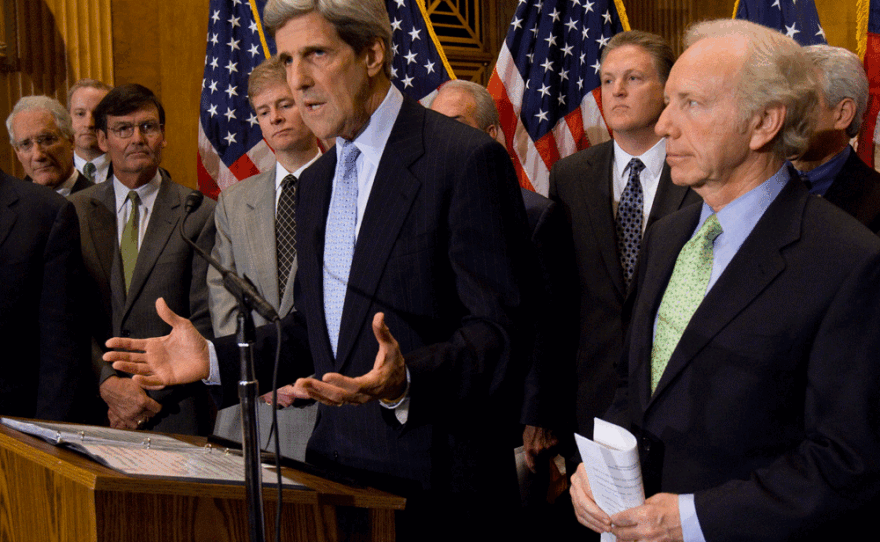Sens. John Kerry and Joe Lieberman have introduced a new energy and climate change bill that they hope will finally break a logjam that has prevented such legislation from passing for many years. But some of the states that pioneered climate change programs are unhappy about the bill's fine print.
Pete Grannis, commissioner of New York's Department of Environmental Conservation, says that for years, the federal government sat on the sidelines and refused to enact serious policies to combat climate change.
"In the meantime, states have gone ahead on their own and taken initiatives that start to address the global climate problems of greenhouse gases," Grannis said.
Undercuts State Programs
New York is part of a 10-state program that has capped greenhouse gas emissions from power plants and set up an auction for electric companies to buy the right to pollute.
"We've had seven to eight auctions to date. We've sold all the allowances. We've been reinvesting the proceeds in energy-efficiency initiatives and innovations," Grannis said. "So we believe it's been very successful."
Other states in the West and Midwest are working on similar regional cap-and-trade programs.
The Kerry-Lieberman bill would set up a national cap-and-trade program much like those. But at the same time, it would wipe away the right for states to keep using their own programs. Senate aides say their bill is tougher than what the states are doing.
Grannis doesn't accept that.
"We have voiced our concern right from the beginning, both in the House version and very strenuously with Sen. Kerry, Sen. Lieberman, and think we ought to be left to our own devices," he said.
That way, states could kick their programs back into gear if, for example, a federal program wasn't cutting pollution fast enough or if it got derailed by a lawsuit or shelved by a president or a Congress that did not support it.
Effect On Clean Air Act
One argument for not killing the state programs, Grannis says, is that the Kerry-Lieberman bill also would take away much of the power the Environmental Protection Agency now has to control greenhouse gas pollution.
The U.S. Supreme Court told the EPA that it does have the authority under the Clean Air Act to cut greenhouse gases, and the EPA is moving ahead to create programs to do that. But the way the bill is drafted, these programs could be halted.
"The Clean Air Act would not be allowed to deal with greenhouse gases the way it did with lead, the way it did with ozone, the way it did with carbon monoxide -- all of which are success stories," said Bill Snape, a lawyer for the Center for Biological Diversity, an environmental group. "The biggest problem with what John Kerry and Joe Lieberman are proposing is that they're going to waive, literally gut, take out the Clean Air Act and replace it with this sort of experimental law that they are concocting, even though the Clean Air Act has reduced all pollutants it has taken aim at over its 40-year history, and even though the Clean Air Act has been held by the Supreme Court to deal with global warming."
Giving industries exemptions from the Clean Air Act and state cap-and-trade programs was essential for rounding up support for the bill. Many electric companies and manufacturing firms have lined up behind it. The bill's authors hope industry endorsements will help win the votes of Democratic senators from states that produce and burn a lot of coal, and from some Republicans.
Fred Krupp, president of Environmental Defense Fund, is one of the environmental leaders who say the bill is a good deal for the planet.
"Our best shot at sustained and substantial pollution reductions and job-creating investments is in national legislation that reduces carbon pollution by amounts certain," Krupp said. "The Clean Air Act may or may not be able to do that."
Krupp says that though states will be unable to run their own cap-and-trade programs, they still will play an important role. For instance, they will be able to mandate the use of more renewable power -- like wind and solar -- and require buildings to use less energy.
Copyright 2022 NPR. To see more, visit https://www.npr.org. 9(MDAzMjM2NDYzMDEyMzc1Njk5NjAxNzY3OQ001))







